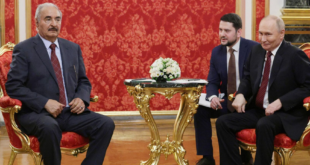Secretary of State Tony Blinken told Moroccan Foreign Minister Nasser Bourita in a phone call on Friday that the Biden administration would not reverse President Trump’s recognition of Morocco’s sovereignty over the Western Sahara, at least for the time being, two sources familiar with the call told me.
Why it matters: Trump’s recognition of the Western Sahara as part of Morocco reversed decades of U.S. policy regarding the disputed territory, and was part of a broader deal that included the renewal of diplomatic relations between Morocco and Israel.
The U.S. decision last December was a long-sought diplomatic breakthrough for Morocco. The kingdom was concerned it could be reversed once Biden took office.
Israel was also concerned that a reversal of the policy would harm the normalization process with Morocco.
The U.S. is the only Western country to recognize Morocco's sovereignty over the Western Sahara, which was annexed by Morocco in 1975 after former colonial power Spain surrendered control.The backstory: There had been almost no contact between the Biden administration and the Moroccan government over the first three months of the new administration.
Ten days ago, Biden's Middle East advisor, Brett McGurk, spoke to Bourita and gave the impression that there would be no change in the U.S. policy on Western Sahara, a source familiar with the call told me.
The State Department readout of Blinken's call with Bourita on Friday didn't mention Western Sahara, but two sources familiar with the call confirm that it was discussed and that Blinken said the Biden administration would not reverse Trump's policy for now.
According to the State Department readout Blinken "welcomed Morocco’s steps to improve relations with Israel and noted the Morocco-Israel relationship will bring long-term benefits for both countries."The state of play: Senior White House and State Department officials have held multiple discussions on this issue over the last few weeks.
The decision that emerged from these discussions was not to reverse Trump's policy but to work with the Moroccans on appointing a new UN envoy for the Western Sahara in order to try and resume talks on possible autonomy for the sparsely populated territory, according to two sources familiar with those discussions.
The State Department referred Axios to the official readout, and did not offer further comment. Eurasia Press & News
Eurasia Press & News



